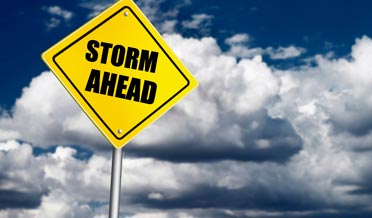HVAC Hurricane Safety: What You Need to Know

HVAC Hurricane Safety: What You Need to Know
Step for HVAC Hurricane Safety Before and After the Storm
Several communities that were in the path of the most recent hurricane are now in recovery mode. The path and intensity of hurricanes are unpredictable—but preparedness plans are the same each year. Hurricanes cause damage from storm surge, high sustained winds, and localized flooding, due to heavy rainfall.
Wise homeowners in hurricane-prone areas make themselves aware of preparedness plans such as evacuation plans and food/water storage. This is a short hurricane-preparedness plan for your air conditioning system. Remember that your central air conditioner has two parts, an indoor unit, and an outdoor condenser unit. This HVAC Hurricane Safety plan will cover both units.
Limb Awareness
One of the dangers of high winds on your property is damage from limbs and trees, especially to the condenser unit. The sturdy-looking cabinet is actually constructed of a network of thin tubes and even thinner metal fins, which are very fragile.
Limbs that come crashing down or are carried by 100-mile-per-hour winds will do considerable damage to the unit. Make sure to trim trees away from structures, including the condenser unit.
Strap it Down
An average air conditioner condenser unit weighs approximately 200 lbs. That might seem too heavy to move easily, but it is nothing in the face of the high winds of a hurricane.
- This condenser unit is a considerable investment, do not let it blow away.
- The condenser makes a very damaging projectile.
Find a strap kit to secure your condenser to a pad or the home to prevent it from moving during a hurricane.
Cover It
- There is a benefit to covering the condenser unit before the storm arrives to protect it from flying debris. Some solutions are to use a large tarp, or a box made of plywood. Plywood is more solid and gives better protection.Both solutions will need to be secured before the storm arrives and after the power has been shut off to the air conditioner. DO NOT use the air conditioner with the condenser covered.
Cool Down, Then Shut Down
Immediately before the storm arrives, turn the thermostat 8 to 100 lower. The air conditioner will be shut off for several hours to a couple of days, so enjoy the cool while you can. This task will take some time since the cooling needs to be completed before you cover the condenser.
Be Patient
When wind and lightning threaten the power grid, it is time to turn the air conditioner off. Power surges happen when lightning strikes any part of the electrical system. They also happen when the wind causes the power to pop on and off quickly.
Turn the thermostat to the OFF position and trip the circuit breaker for the AC at the electrical service panel. Leave the system off until the storm passes.
If you notice the cover for the condenser unit working free or blowing away, let it go and do not try to retrieve it. The potential injury from flying debris is too great to be concerned about the cover.
The eye of the hurricane is a calm area at the very center of the storm. Do not be fooled by the eye, should it pass over your home. Wait for the entire hurricane to pass and the wind to diminish.
HVAC Hurricane Safety After the Storm
Once it is safe to venture outside, make a thorough inspection for damage. Notice the roof, windows, and siding. Check the condenser unit and surroundings:
- To ensure the condenser is still secure on the pad.
- For potential damage to the unit from flying debris. Also check the interior of the condenser for an accumulation of leaves and limb litter.
- And inspect the coolant tubing and electrical connections between the unit and the home.
Check the indoor portion of your air conditioner, including water damage. Keep the unit off until you remove any covering over the condenser. Then:
- Flip the circuit breaker at the service panel
- Turn the thermostat down a few degrees lower than the temperature setting. Take your time while lowering the temperature in the home.
Have questions about HVAC Hurricane Safety, Call us today!
Contact our HVAC Hurricane Safety team at Doctor Cool & Professor Heat today at 281-338-8751 or email Doctor Cool and let our professional Residential AC Repair technicians assist with all of your HVAC Hurricane Safety questions.
